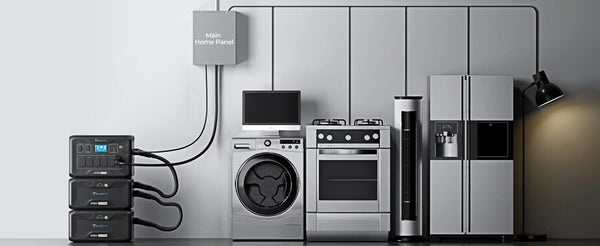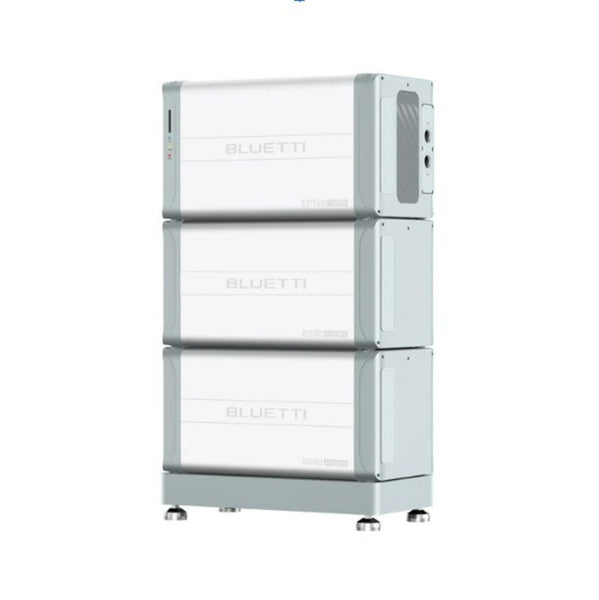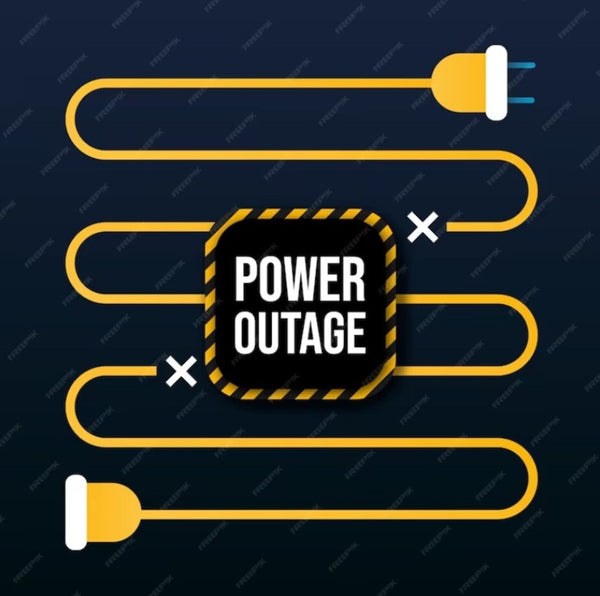The increasing global emphasis on sustainable energy sources has led to a surge in interest and adoption of solar panels. Solar panels have gained popularity in the United Kingdom as a renewable energy solution, where homeowners are increasingly looking to harness the sun's power to reduce their carbon footprint and energy bills. This comprehensive guide will explore various aspects of solar panels in UK homes, addressing common questions and concerns, ranging from the average number of solar panels, and solar panel cost to how many solar panels do I need in the UK.
How Many Solar Panels Do You Need for Your Home on Average in the UK?
The number of people living in a home is one of the elements that determines how many solar panels you require. An average home of two to three people uses about 2,900 kWh of electricity annually.
When determining the number of solar panels you require, the size of your home is also a crucial consideration. To get a sense of how many solar panels are needed to power homes of various sizes, look at the table below.
|
House size |
Solar PV system size |
Number of solar panels (250W) |
Number of solar panels (400W) |
|
Flat or 1-bedroom house |
< 2000 kWh |
2 – 4 |
2 – 6 |
|
3-bedroom house |
2000 – 4000kWh |
4 – 6 |
6 – 11 |
|
4 or 5-bedroom house |
4000 – 6000kWh |
7 – 9 |
11 – 16 |
|
5+ bedroom house |
6000 – 8000kWh |
10 – 15 |
16 – 21 |
In the UK, a home with more than five people should consider a 6kW solar panel system with batteries, while a house with four people would typically benefit from a 5kW solar system. One of the most popular solar panel sizes for residential solar systems is a 4kW system, which is appropriate for homes with three to four people.
Whether your installation is 3kW or 6kW and the size of the solar panels you plan to utilize will determine how many solar panels you require. For instance, 12 solar panels are needed to create a 3kW solar system using 250W panels. For a 6kW installation, 24 solar panels are needed.
Whether you want your solar panels to provide all or just a portion of your electricity demands will also affect the average number of solar panels.
A UK home's average daily energy use is between 3 and 6 kWh. Some UK homeowners choose to use solar energy to power only a portion of their energy needs, which would result in fewer solar panels being placed.
How to Calculate the Right Solar Array Size?
It would help if you first determined how much energy your solar system must produce daily to choose the PV panel size you need. The amount of sunlight in your area and the size of your roof are also crucial factors to consider, as they help you calculate the maximum number of solar panels your roof can support.
In the UK, a 3kW solar system typically requires 12 solar panels, and a 6kW installation requires 24 solar panels. The larger the panel, the more energy is produced per square meter.
The approximate quantities of area required to produce a given amount of energy are displayed in the table below.
|
Size of solar panels |
Number of 250W panels |
Estimated surface area |
|
3kW |
12 |
19.2 m² |
|
4kW |
16 |
25.6 m² |
|
5kW |
20 |
32.0 m² |
|
6kW |
24 |
38.4 m² |
You may examine your monthly energy bills to determine how much electricity your solar panels need to generate and how much you need to place on your roof. These can give you information on how much energy you use each day and how much electricity your solar panels need to produce each day.
For instance, your daily use in January would be 4 kWh if your monthly consumption was 124 kWh. It indicates that 4 kWh should be produced every day on average by the solar system. The estimated daily solar system power output is also known as 4 kWh.
Determining individual solar panel sizes
To determine the appropriate size of solar panels for your residence, consider the following factors:
- Understand the energy generation capabilities of solar panels with varying capacities.
- Evaluate the available roof space in square meters to determine the capacity your roof can accommodate.
- Familiarize yourself with the dimensions of solar panels based on their size or brand.
Solar panels exhibit different energy generation capacities, influenced by their wattage size or rating. For instance, a 250-watt panel can produce up to 250 watts per sun hour, while a 300-watt panel can generate up to 300 watts per sun hour. Consequently, it is crucial to ascertain your energy requirements before determining the size of solar panels.
Calculating the required number of solar panels depends on the roof's capacity, as different panel sizes have varying dimensions. In the example above, installing sixteen 250W solar panels necessitates a surface area of 25.6 m². On the other hand, installing 12 350W solar panels requires a surface area of 22.8 m². Therefore, understanding the available space is crucial. The following table outlines average solar panel dimensions and weight based on system size:
|
Solar panel size (W)* |
Solar panel dimensions* |
Weight per panel |
|
250 |
1.6 m x 1 m |
18 kg |
|
300 |
1.67 m x 1 m |
18 kg |
|
350 |
1.9 m x 1 m |
21.6 kg |
*It is important to note that different brands may have different solar panel dimensions.
What Type of Solar Panels Should I Install?
Choosing the correct type of solar panels is crucial for maximizing energy production and ensuring a solid return on investment. The two main types of solar panels are monocrystalline and polycrystalline. Monocrystalline panels are known for their higher efficiency and sleek design, making them a popular choice for residential installations. On the other hand, polycrystalline panels are more cost-effective but may have slightly lower efficiency.
In recent years, technological advancements have led to the development of thin-film solar panels, which are lightweight and flexible. While these panels are less efficient than traditional crystalline panels, they offer greater design flexibility and can be suitable for specific installations.
It's essential to consider your budget, energy goals, and available roof space when choosing your home's type of solar panels.
What is the Cost of Solar Panels?
The cost of solar panels in the UK can vary based on factors such as panel type, system size, and installation complexity. The latest available data shows that the average cost per installed kilowatt solar capacity in the UK is around £1,800 to £4,500. This cost includes the solar panels, inverters, mounting hardware, and installation.
Government incentives, such as the Feed-in Tariff (FIT) and the Smart Export Guarantee (SEG), have significantly made solar panel installations more financially attractive. Although closed to new applicants, the FIT provided payments for the excess electricity generated by solar panels. The SEG, which replaced the FIT, ensures homeowners are paid for the surplus energy they export to the grid.
When considering the cost of solar panels, it's crucial to factor in potential long-term savings on energy bills and the positive environmental impact, making solar panel installations a viable and sustainable investment.
Do I Need Solar Battery Storage?
Solar battery storage systems have gained popularity to enhance the efficiency of solar panel installations. These batteries store excess energy generated during sunny periods, allowing homeowners to use that stored energy during low solar production or high energy demand. One key advantage is increased energy independence. With a solar battery, you can reduce reliance on the grid, especially during power outages or periods of high electricity demand. Additionally, solar battery storage enables homeowners to maximize the self-consumption of solar energy, lowering dependence on conventional grid electricity.
BLUETTI AC500+B300S Home Battery Backup
You are introducing the BLUETTI AC500+B300S Home Battery Backup System. This advanced system offers a range of features designed to provide reliable power and versatility for your home. A robust 5,000W rated power (10,000W surge) ensures consistent performance during peak demand.

The LiFePO4 battery boasts an impressive 3,072Wh~18,432Wh expandable capacity, with over 3,500 life cycles to 80%, ensuring long-term reliability. The system can be conveniently controlled via a Smart APP, offering WiFi and Bluetooth connectivity for seamless management.
Featuring six ways to recharge, including AC, Solar, Car, Generator, Lead Battery, and Dual Charging (Dual AC/AC+Solar), the BLUETTI AC500 + B300S provides flexibility in charging options to suit various scenarios.
With 16 versatile outlets, compatible with 99% of devices, this system caters to diverse power needs. Moreover, it allows you to tie to the home grid, ensuring 24/7 uninterruptible power supply (UPS) capabilities.

FAQS
What daily output should be expected from a 4kW solar system in the UK?
A 4kW solar system typically generates around 16kWh per day. However, this output is subject to various external factors associated with the property and its energy consumption.
What quantity of solar panels is necessary to achieve off-grid home power?
The number of solar panels required for off-grid living depends on your planned energy consumption, the size of your residence, and factors related to its structure and placement.
How many solar panels are recommended for a 4-bedroom house?
A 4-bedroom house generally requires a solar panel system of 4 to 5kW. However, the specific type of system needed can vary based on multiple factors, including the house's characteristics.
What is the typical number of solar panels for an average UK home?
The average energy consumption in the UK is around 3,800kWh, necessitating a 10,400W solar system. Nonetheless, this requirement can fluctuate based on household size, energy usage patterns, and other relevant considerations.
Conclusion
Adopting solar energy through solar panels in UK homes is a transformative step towards sustainability and energy independence. As technology advances and the cost of solar panels continues to decrease, more homeowners are finding it financially viable to harness the sun's power.
The decision-making process involves carefully considering various factors, from determining the right solar array size to choosing the appropriate type of solar panel and finding a reliable installer. Understanding the average number of solar panels, calculating system size, and exploring the costs and benefits empower homeowners to make informed choices that align with their energy goals and financial considerations.




